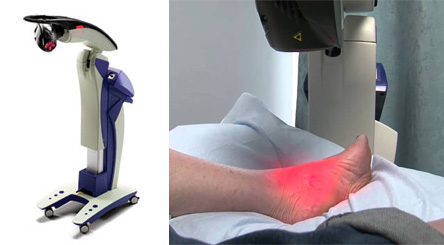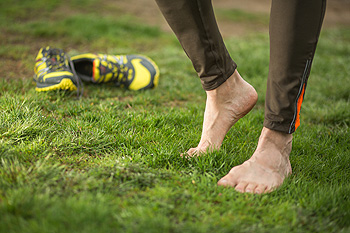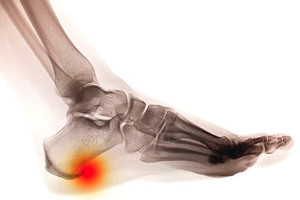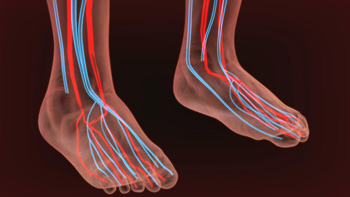Items filtered by date: July 2019
Can Shockwave Therapy Help Plantar Fasciitis?
 Patients who have chronic foot pain may understand the benefits of receiving shockwave therapy. Shockwave therapy can be helpful in alleviating pain that comes from plantar fasciitis. There are two forms of this type of treatment, and they are known as high and low energy. The former is administered in three or more sessions, which are generally not painful. The latter is often given with a form of anesthesia and can produce severe pain and discomfort. Both forms of this type of treatment use pressurized air or electromagnetic pulses, which may be effective in reducing a portion of chronic foot pain from plantar fasciitis. If you have this type of foot pain, schedule a consultation with your podiatrist to help you determine if this type of treatment is correct for you.
Patients who have chronic foot pain may understand the benefits of receiving shockwave therapy. Shockwave therapy can be helpful in alleviating pain that comes from plantar fasciitis. There are two forms of this type of treatment, and they are known as high and low energy. The former is administered in three or more sessions, which are generally not painful. The latter is often given with a form of anesthesia and can produce severe pain and discomfort. Both forms of this type of treatment use pressurized air or electromagnetic pulses, which may be effective in reducing a portion of chronic foot pain from plantar fasciitis. If you have this type of foot pain, schedule a consultation with your podiatrist to help you determine if this type of treatment is correct for you.
Shockwave therapy is a treatment commonly used to treat various injuries and conditions, particularly plantar fasciitis in the feet. To learn more, consult with Dr. Joshua David Scoll from Pennsylvania. Our doctor can provide the care you need to keep you pain-free and on your feet.
Shockwave Therapy
Shockwave therapy is a new treatment option designed to treat bone conditions such as tennis elbow, shoulder pain, and others. Shockwave therapy uses high intensity sound waves that are directed to the affected tissues of the body with pinpoint accuracy. The effects are very beneficial, leading to a production of collagen fibers, eliminating inflammation.
Who Benefits from Shockwave?
Shockwave is recommended for patients suffering from heel pain and associated problems. Heel pain is a common condition which can be caused by obesity, overexertion, and spending a substantial amount of time on hard floors with your feet exposed and unsupported.
Fast and Easy
The therapy is actually a simple process that can leave patients feeling better the very next day. Shockwave therapy is not as dramatic as it sounds. It enables more blood flow to effected areas, addressing the source of the problem and allowing treatment to last for a long time.
Treatment & Recovery Time
Shockwave treatment will enable your feet to recover quickly. This is especially important since surgery is not required. It is cost effective and does not require the use of anesthesia. This treatment is a better option to surgery, since it is proven safe.
If you have any questions, please feel free to contact one of our offices located in Philadelphia, Bensalem, and Fairless Hills, PA . We offer the newest diagnostic and treatment technologies for all your foot and ankle needs.
Habits That Can Help to Prevent Running Injuries
 Research has shown it is beneficial for runners to develop habits that may help to prevent running injuries. Warming up before a run can improve range of motion and improve flexibility. Many runners find it helpful to begin their run with a purpose. This may include focusing on speed one day, and endurance the next day, in addition to deciding on what type of road to run on. Implementing breathing techniques may help to reduce any stiffness and tension that has developed during the run. It is important to stretch the body daily before a running practice begins, as this can help the hips, ankles and knees to remain flexible. If you would like additional information about how to prevent running injuries, it is suggested to counsel with a podiatrist, who can provide you with the correct techniques.
Research has shown it is beneficial for runners to develop habits that may help to prevent running injuries. Warming up before a run can improve range of motion and improve flexibility. Many runners find it helpful to begin their run with a purpose. This may include focusing on speed one day, and endurance the next day, in addition to deciding on what type of road to run on. Implementing breathing techniques may help to reduce any stiffness and tension that has developed during the run. It is important to stretch the body daily before a running practice begins, as this can help the hips, ankles and knees to remain flexible. If you would like additional information about how to prevent running injuries, it is suggested to counsel with a podiatrist, who can provide you with the correct techniques.
All runners should take extra precaution when trying to avoid injury. If you have any concerns about your feet, contact Dr. Joshua David Scoll of Pennsylvania. Our doctor will treat your foot and ankle needs.
How to Prevent Running Injuries
There are a lot of mistakes a runner can make prior to a workout that can induce injury. A lot of athletes tend to overstretch before running, instead of saving those workouts for a post-run routine. Deep lunges and hand-to-toe hamstring pulls should be performed after a workout instead of during a warmup. Another common mistake is jumping into an intense routine before your body is physically prepared for it. You should try to ease your way into long-distance running instead of forcing yourself to rush into it.
More Tips for Preventing Injury
- Incorporate Strength Training into Workouts - This will help improve the body’s overall athleticism
- Improve and Maintain Your Flexibility – Stretching everyday will help improve overall performance
- “Warm Up” Before Running and “Cool Down” Afterward – A warm up of 5-10 minutes helps get rid of lactic acid in the muscles and prevents delayed muscle soreness
- Cross-Training is Crucial
- Wear Proper Running Shoes
- Have a Formal Gait Analysis – Poor biomechanics can easily cause injury
If you have any questions, please feel free to contact one of our offices located in Philadelphia, Bensalem, and Fairless Hills, PA . We offer the newest diagnostic and treatment technologies for all your foot care needs.
Heel Spur Facts
A heel spur is a bony protruding outgr owth on the bone of the heel. They can be located either at the back of the heel or under it. Heel spurs located at the back of the heel are most often associated with inflammation of the Achilles tendon, which can cause tenderness and heel pain. Heel spurs will be diagnosed based on if you have a history of heel pain and if there is tenderness at the bottom of the heel. An X-Ray is typically required to confirm this. Some treatments for heel spurs include applying ice to the spot of the spur, orthotic devices or shoe inserts, anti-inflammatory medications such as Aleve and Advil, cortisone injections and sometimes surgery. Generally, heel spurs don’t lead to any long term conditions, as they usually respond well to the treatments mentioned previously. If you feel you may have developed a heel spur, it is advised that you go see a podiatrist.
owth on the bone of the heel. They can be located either at the back of the heel or under it. Heel spurs located at the back of the heel are most often associated with inflammation of the Achilles tendon, which can cause tenderness and heel pain. Heel spurs will be diagnosed based on if you have a history of heel pain and if there is tenderness at the bottom of the heel. An X-Ray is typically required to confirm this. Some treatments for heel spurs include applying ice to the spot of the spur, orthotic devices or shoe inserts, anti-inflammatory medications such as Aleve and Advil, cortisone injections and sometimes surgery. Generally, heel spurs don’t lead to any long term conditions, as they usually respond well to the treatments mentioned previously. If you feel you may have developed a heel spur, it is advised that you go see a podiatrist.
Heel spurs can be incredibly painful and sometimes may make you unable to participate in physical activities. To get medical care for your heel spurs, contact Dr. Joshua David Scoll from Pennsylvania. Our doctor will do everything possible to treat your condition.
Heels Spurs
Heel spurs are formed by calcium deposits on the back of the foot where the heel is. This can also be caused by small fragments of bone breaking off one section of the foot, attaching onto the back of the foot. Heel spurs can also be bone growth on the back of the foot and may grow in the direction of the arch of the foot.
Older individuals usually suffer from heel spurs and pain sometimes intensifies with age. One of the main condition's spurs are related to is plantar fasciitis.
Pain
The pain associated with spurs is often because of weight placed on the feet. When someone is walking, their entire weight is concentrated on the feet. Bone spurs then have the tendency to affect other bones and tissues around the foot. As the pain continues, the feet will become tender and sensitive over time.
Treatments
There are many ways to treat heel spurs. If one is suffering from heel spurs in conjunction with pain, there are several methods for healing. Medication, surgery, and herbal care are some options.
If you have any questions feel free to contact one of our offices located in Philadelphia, Bensalem, and Fairless Hills, PA . We offer the latest in diagnostic and treatment technology to meet your needs.
What Are Systemic Diseases of the Foot?
There are several systemic diseases that can  both display symptoms in the feet and impact the health of the feet. Common systemic diseases in the foot include gout, diabetes mellitus, arthritis and neurological disorders such as diabetic neuropathy and peripheral vascular disease. These can all have a significant impact on your feet. At the same time, these systemic diseases can be effectively treated to minimize both joint and muscle damage if they are diagnosed early and treated with medication. Diabetics with a systemic disease must closely monitor their blood sugar levels. People with arthritis that also have a systemic disease must ensure they are taking the proper treatments. If you feel you may have a systemic disease, it is important to see a podiatrist as soon as you can.
both display symptoms in the feet and impact the health of the feet. Common systemic diseases in the foot include gout, diabetes mellitus, arthritis and neurological disorders such as diabetic neuropathy and peripheral vascular disease. These can all have a significant impact on your feet. At the same time, these systemic diseases can be effectively treated to minimize both joint and muscle damage if they are diagnosed early and treated with medication. Diabetics with a systemic disease must closely monitor their blood sugar levels. People with arthritis that also have a systemic disease must ensure they are taking the proper treatments. If you feel you may have a systemic disease, it is important to see a podiatrist as soon as you can.
When dealing with systemic disease of the feet, it is extremely important to check the affected areas routinely so that any additional problems are caught quickly. If you have any concerns about your feet and ankles contact Dr. Joshua David Scoll from Pennsylvania. Our doctor will assist you with all of your podiatric needs.
Systemic Diseases of the Feet
Systemic diseases affect the whole body, and symptoms usually are displayed in the feet. This condition can make a patient’s ability to walk unbearable. Systemic diseases include gout, diabetes mellitus, neurological disorders, and arthritis.
Gout – is caused by an excess of uric acid in the body. Common symptoms include pain, inflammation, and redness at the metatarsal/phalangeal joint of the base big toe. Gout can be treated by NSAIDs to relieve pain and inflammation, and other drugs that lower the acid levels in the body.
Diabetes mellitus – is an increase in the level of blood sugar that the body cannot counteract with its own insulin. Failure to produce enough insulin is a factor in Diabetes.
Diabetes of the Feet
Diabetic Neuropathy – may lead to damaged nerves and affect the feet through numbness and loss of sensation.
Peripheral Vascular Disease – can restrict the blood flow to the feet, and often times lead to amputation of the feet.
If you have any questions please feel free to contact one of our offices located in Philadelphia, Bensalem, and Fairless Hills, PA . We offer the newest diagnostic and treatment technologies for all your foot and ankle needs.
It's Time for Beautiful Feet
Is Heel Pain Common?
 There are many people who experience heel pain at some point in their lives. It can originate from a variety of factors. These include the conditions known as plantar fasciitis, heel spurs, and Achilles tendonitis. The former is caused by an inflamed band of tissue on the bottom of the foot called the plantar fascia. This can occur as a result of overstretching the feet, and may be common in diabetic and obese patients. Heel spurs are described as a calcium growth that develops as the sole of the foot endures strain from daily activities, or from wearing shoes that do not fit correctly. The latter condition can form when the Achilles tendon becomes inflamed. This can arise from specific types of arthritis, or from excessive running and jumping activities. If you have any type of heel pain, it is advised that you seek the counsel of a podiatrist who can properly treat foot conditions.
There are many people who experience heel pain at some point in their lives. It can originate from a variety of factors. These include the conditions known as plantar fasciitis, heel spurs, and Achilles tendonitis. The former is caused by an inflamed band of tissue on the bottom of the foot called the plantar fascia. This can occur as a result of overstretching the feet, and may be common in diabetic and obese patients. Heel spurs are described as a calcium growth that develops as the sole of the foot endures strain from daily activities, or from wearing shoes that do not fit correctly. The latter condition can form when the Achilles tendon becomes inflamed. This can arise from specific types of arthritis, or from excessive running and jumping activities. If you have any type of heel pain, it is advised that you seek the counsel of a podiatrist who can properly treat foot conditions.
Many people suffer from bouts of heel pain. For more information, contact Dr. Joshua David Scoll of Pennsylvania. Our doctor can provide the care you need to keep you pain-free and on your feet.
Causes of Heel Pain
Heel pain is often associated with plantar fasciitis. The plantar fascia is a band of tissues that extends along the bottom of the foot. A rip or tear in this ligament can cause inflammation of the tissue.
Achilles tendonitis is another cause of heel pain. Inflammation of the Achilles tendon will cause pain from fractures and muscle tearing. Lack of flexibility is also another symptom.
Heel spurs are another cause of pain. When the tissues of the plantar fascia undergo a great deal of stress, it can lead to ligament separation from the heel bone, causing heel spurs.
Why Might Heel Pain Occur?
- Wearing ill-fitting shoes
- Wearing non-supportive shoes
- Weight change
- Excessive running
Treatments
Heel pain should be treated as soon as possible for immediate results. Keeping your feet in a stress-free environment will help. If you suffer from Achilles tendonitis or plantar fasciitis, applying ice will reduce the swelling. Stretching before an exercise like running will help the muscles. Using all these tips will help make heel pain a condition of the past.
If you have any questions please contact one of our offices located in Philadelphia, Bensalem, and Fairless Hills, PA . We offer the newest diagnostic and treatment technologies for all your foot and ankle needs.

